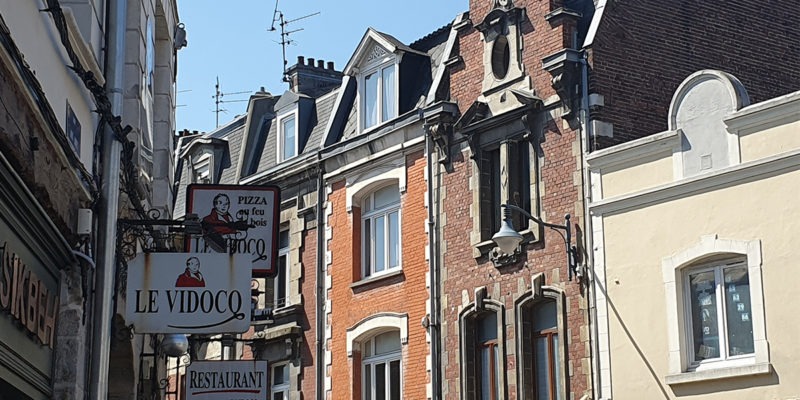Eugène-François Vidocq is an emblematic figure in French history and the fight against crime, as well as a local figure in Arras, like Adam de la Halle. Born on July 24, 1775 in Arras and died on May 11, 1857 in Paris, he is best known forhis “multiple talents“: he was a criminal, a detective and head of the security police under Napoleon. In this article, we invite you to discover Vidocq’s biography, his beginnings in Arras, his famous deeds and his presence in the arts.
Biography and beginnings in Arras
Eugène-François Vidocq was born into a modest family in Arras. His father, Nicolas Vidocq, was a baker, and his mother, Henriette Françoise Vidocq, was a housewife. From an early age, Vidocq distinguished himself by his rebellious and independent character, even pilfering from the bakery tills (the bakery still exists on the corner of rue des Trois Visages). He left school at a very early age and worked at a series of odd jobs. At 16, he joined the army and took part in several military campaigns. Back in Arras, Vidocq married but led a dissolute life, indulging in theft. His misdeeds earned him several stints in prison, where he made friends with many criminals.
Vidocq the convict turned policeman
Sentenced to eight years’ hard labor for “forgery”, Vidocq manages to escape from prison twice. His reputation grew among the country’s criminals and the police, to whom he offered his services as an informer. Highly gifted in this role, he was eventually appointed head of a brigade where he proved extremely effective, despite his unconventional methods. He was pardoned by King Louis XVIII in 1818.
Suspected oforganizing criminal operations himself and collaborating with those he apprehended (a staggering 16,000 people in all),he was forced to resign. However, Vidocq didn’t stop there: on the strength of his experience, he created a forgery-proof paper and opened his own factory. He also became janitor of the prestigious Galerie Vivienne, where he founded the capital’s first private detective agency.
Famous facts
Eugène-François Vidocq is best known for creating the Brigade de sûreté, the forerunner of the French judicial police, in 1811. After convincing Napoleon of the usefulness of such a brigade, he set up a team of repentant former criminals, convinced that their experience would enable them to better understand and combat crime. This famous figure from Arras broke new ground in criminal investigation, using modern techniques such as ballistics and forensic medicine. Under his leadership, the Brigade de sûreté solved numerous criminal cases and contributed to lowering the crime rate in France.
Vidocq in the arts (Literature and Cinema)
The character of Vidocq has inspired many authors and artists. Among the most famous is Victor Hugo, who drew inspiration from him to create the character of Jean Valjean in his novel “Les Misérables”. Alexandre Dumas also referred to Vidocq in “Les Mohicans de Paris”. On the silver screen, Vidocq has been portrayed by a number of actors, including Gérard Depardieu in the film “Vidocq” (2001) directed by Pitof. Other film adaptations include “Le Dossier 51” (1978), in which Vidocq is played by Michel Bouquet, and “L’Empereur de Paris” (2018) with Vincent Cassel in the title role. On television, a series entitled “Les Nouvelles Aventures de Vidocq” was broadcast in France between 1971 and 1973, with Claude Brasseur in the lead role. More recently, the series “Les Aventures extraordinaires de Vidocq” stars Bruno Madinier in the role of the famous detective. In literature, Vidocq has also inspired biographies, novels and comic strips. One of the most notable works is “Mémoires de Vidocq, chef de la police de sûreté jusqu’en 1827, aujourd’hui propriétaire et fabricant de papiers à Saint-Mandé”, published in 1828 and written by Vidocq himself, with the help of a literary ghostwriter. The book was a great success in France and abroad, and contributed greatly to Vidocq’s popularity.
Go to the eponymous street in Arras
Rue Vidocq in Arras is located on the former Rue du Miroir-de-Venise, where Vidocq was born in 1775. Today, this street corresponds to the upper part of the Rue des 3 Visages, which runs between the Belfry and Rue aux Ours, right next to Place des Héros :
To conclude
Eugène-François Vidocq is a fascinating and complex character, whose adventurous life and innovative crime-fighting methods have left their mark on French police history. His journey from delinquent to head of the Brigade de sûreté has inspired numerous literary and cinematic works, making Vidocq an emblematic figure in the popular culture of Arrage and France.
R.C.
